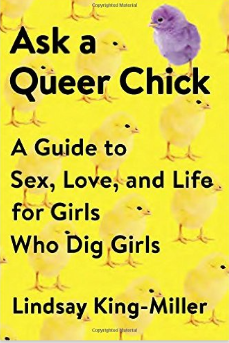Reviewed by Ellyn Ruthstrom
Raise your hand if you’ve ever picked up a dating advice book for women who date women and somewhere in chapter one you somehow realize your bi-ness is not being acknowledged and it may even be mentioned negatively. Yeah, me too. The great news is that Ask a Queer Chick (Plume, 2016) is the best dating book for bi women that you will ever find!
Having the term “queer” in the title may be the first hint that the advice will come from a younger generation of inclusiveness. And then knowing that Lindsay King-Miller is a b-girl really helps to assuage any fear that you’ll have to wade through the usual casual biphobia that can pop up in such spaces. King-Miller started Ask a Queer Chick on The Hairpin website in 2011 (you can still find some of the older pieces there), and you can now find her column at fusion.net.
So what does a queer chick need to know these days? Lots of the same things we’ve needed for the last few decades: how to come out, how to find other queer folks, sex tips, and advice on breaking up. The first two-thirds of the book offers a lot of sensible advice on all these topics, such as succinct coming out tips: “First, tell them what you call yourself. Next, tell them what that means. Then, tell them what’s going to change. Finally, tell them how you expect them to behave.” After that, she offers a couple possible scripts for you to use from this strategy.
And, with her awesome perspective, King-Miller adds some insights about why coming out as bi is distinctive. Some people don’t believe you, others you end up having to come out to multiple times, and still others don’t understand that your orientation isn’t about the sex or gender of your current partner. In a wonderfully witty way, King-Miller explains how we have to deal with bi invisibility: “I wish I could tell you there’s a way around it, but frankly, your best bet is to be prepared to gently, but firmly, correct people for the rest of your life or until the heat death of the universe, whichever comes first.”
Indirectly referencing the Klein Scale of sexual orientation, she writes, “Your orientation isn’t just your history, it’s your wishes and desires as well. You can be queer if you’ve never kissed a girl; you can be bisexual if you’ve dated only one gender; you can be asexual if you’ve had sex.” How refreshing! Her writing is also trans-inclusive, so yet another plus.
When she advises about dating, I found her tips on red flags to look out for to be spot on. Watch out for women who hate all their exes. Don’t date someone all your friends loathe. Don’t stick around people who persuade you to do things you don’t want to do. Scary tempers are a no-no. And a few more that I’ll leave you to find out by reading the book.
The breakup chapter has all sorts of excellent advice on how to make your decision, how to make the plan to move out, and how to move on emotionally. Best tip ever: Put all the sentimental trinkets and photos, etc., into a box and seal it. Don’t open it for at least six months.
And guess what? There is a whole chapter on being bi+! I’ll just give you a few subheads so you know what to expect: There’s No Such Things as Bi Privilege, Everyone Gets a Gold Star, and The Problem with “Born This Way.” And the best damn thing about this chapter is the last paragraph, which concludes: “If we want strength in numbers, we’ve got to stop prioritizing the needs of monosexual gays and lesbians over the needs of the rest of the community. We’re all here, we’re all queer, and it’s time to get used to each other – and start working together to take over the world.”
Chapter seven is for straight allies, so you can hand it to a friend or family member with a bookmark and let them know you’d consider it a positive step if they read it. Chapter eight deals with discrimination and how to deal with family rejection, workplace harassment or closeting, partner violence and other challenges of being part of the LGBTQ community.
Chapter nine covers marriage and why just because we can get married doesn’t mean we should. Snap! Plenty of people, of all orientations, have no interest in marriage and it’s nice to have that acknowledged. It’s a necessity to have equality of marriage rights—and thankfully we have it now—but King-Miller makes the strong point that marriage is not the endpoint. There are other rights to work for and blending into hetero-normative models is not for everyone.
King-Miller has a delightfully intelligent and irreverent style of writing. Her humor keeps the pages flying by, but the advice is solid and meaningful. It’s much more than an advice book, too, so if you are a newbie to queer culture it’s a fun way to learn the lingo and the secret handshake. Oh, you didn’t know about that?
Ellyn Ruthstrom is feminist as fuck.

